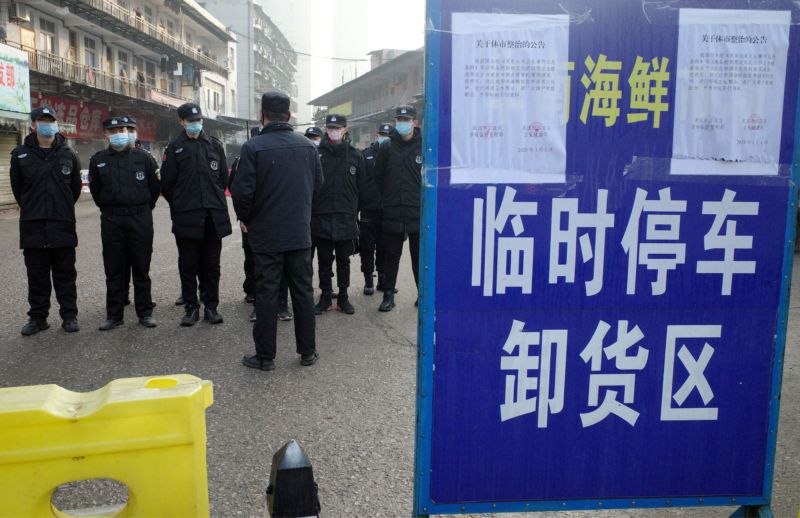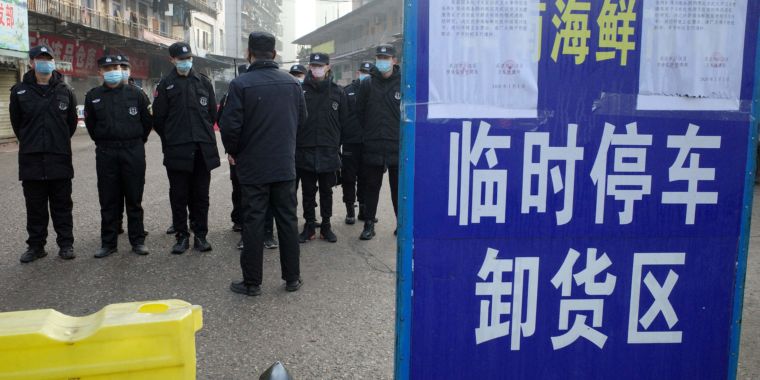
Enlarge / Security guards stand in front of the closed Huanan wholesale seafood market, where health authorities say a man who died from a respiratory illness had purchased goods from, in the city of Wuhan, Hubei province, on January 12, 2020.
A never-before-seen virus that sparked an outbreak of viral pneumonia in the Chinese city of Wuhan has now killed one person and spread to Thailand via a sick traveler.
On Saturday, January 11, officials in Wuhan reported that a 61-year-old man died January 9. Testing indicated he was carrying the virus, which researchers have confirmed is a novel strain of coronavirus.
His is the first recorded death in the outbreak, which erupted last month in Wuhan and has been linked to a live-animal market there. Officials said that the man had been admitted to the hospital with respiratory failure and severe pneumonia. However, they also noted that he had other health issues, namely abdominal tumors and chronic liver disease.
Since officially linking the novel coronavirus to the outbreak, officials in Wuhan have confirmed 41 cases of pneumonia from the viral newcomer. Of those, six are considered severe, and seven cases have been treated and discharged. That tally is down from 59 outbreak cases reported earlier last week, before the viral cause was known.
The sick traveler in Thailand marks the first time that the virus has been confirmed outside of China.
The female traveler, who is also 61 years old, was identified by Thai authorities on January 8 and placed under quarantine, according to the World Health Organization. Genetic tests indicated that she carried the same strain of coronavirus isolated from patients in Wuhan.
Viral monitoring
The Thai Health Ministry told Reuters the traveler has received treatment and is now well enough to return home.
The Ministry added that it has quarantined 12 travelers since January 3 and that tests indicated that the 61-year-old woman's case was the only one linked to the outbreak.
"Being able to identify a patient shows that there is efficiency in our monitoring system. We are confident that we can manage the situation," Public Health Minister Anutin Charnvirakul told reporters.
The World Health Organization responded to the Thai case in a statement, saying:
The possibility of cases being identified in other countries was not unexpected, and reinforces why WHO calls for on-going active monitoring and preparedness in other countries. WHO has issued guidance on how to detect and treat persons ill with the new virus.
The statement also noted that, given the case in Thailand, WHO Director-General Dr. Tedros Adhanom Ghebreyesus is consulting with experts on the threat of the outbreak and is deciding whether an emergency meeting is needed.
So far, the investigators have found no evidence that the virus is spreading from person to person—a good sign for outbreak control. Wuhan officials are still monitoring 687 people, including some medical staff, who had contact with those sickened in the outbreak. So far, no cases have been found among contacts, and no new cases have been identified since January 3.
The live-animal market at the center of the outbreak—the South China Seafood Wholesale Market in Wuhan—closed down on January 1 for decontamination. Researchers are working to learn more about the new coronavirus and its origin.
Coronaviruses are a large group of viruses that can cause everything from mild respiratory infections in humans to the deadly Severe Acute Respiratory Syndrome (SARS). The viruses also plague many animals, namely cats, dogs, bats, mice, and birds. Investigators have ruled out that the new strain is the one that causes SARS or the coronavirus behind Middle East Respiratory Syndrome (MERS).
